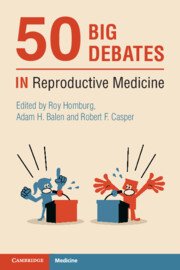Book contents
- 50 Big Debates in Reproductive Medicine
- Series page
- 50 Big Debates in Reproductive Medicine
- Copyright page
- Contents
- Contributors
- Foreword
- Introduction
- Section I Limits for IVF
- Section II IVF Add-ons
- Section III The Best Policy
- Section IV Embryology
- Section V Ethics and Statistics
- Section VI Male-factor Infertility
- Section VII Genetics
- Section VIII Ovarian Stimulation
- Section IX Hormones and the Environment
- 45A Metformin Is an Effective Treatment for Infertility Associated with Anovulatory PCOS
- 45B Metformin Is an Effective Treatment for Infertility Associated with Anovulatory PCOS
- 46A Laparoscopic Ovarian Drilling Should Be Performed for CC-Resistant PCOS
- 46B Laparoscopic Ovarian Drilling Should Be Performed for CC-Resistant PCOS
- 47A Asymptomatic Polycystic Ultrasound Appearance of the Ovary Is Favourable for IVF Outcome
- 47B Asymptomatic Polycystic Ultrasound Appearance of the Ovary Is Favourable for IVF Outcome
- 48A Ultrasound Monitoring Is Not Required for Letrozole Treatment
- 48B Ultrasound Monitoring Is Not Required for Letrozole Treatment
- 49A Progesterone Levels Should Be Measured on the Day of hCG Administration
- 49B Progesterone Levels Should Be Measured on the Day of hCG Administration
- 50A Progesterone Treatment Does Not Help Recurrent Miscarriage Patients
- 50B Progesterone Treatment Does Not Help Recurrent Miscarriage Patients
- 51A The Microbiome Environment Influences IVF Results
- 51B The Microbiome Environment Influences IVF Results
- Index
- References
47B - Asymptomatic Polycystic Ultrasound Appearance of the Ovary Is Favourable for IVF Outcome
Against
from Section IX - Hormones and the Environment
Published online by Cambridge University Press: 25 November 2021
- 50 Big Debates in Reproductive Medicine
- Series page
- 50 Big Debates in Reproductive Medicine
- Copyright page
- Contents
- Contributors
- Foreword
- Introduction
- Section I Limits for IVF
- Section II IVF Add-ons
- Section III The Best Policy
- Section IV Embryology
- Section V Ethics and Statistics
- Section VI Male-factor Infertility
- Section VII Genetics
- Section VIII Ovarian Stimulation
- Section IX Hormones and the Environment
- 45A Metformin Is an Effective Treatment for Infertility Associated with Anovulatory PCOS
- 45B Metformin Is an Effective Treatment for Infertility Associated with Anovulatory PCOS
- 46A Laparoscopic Ovarian Drilling Should Be Performed for CC-Resistant PCOS
- 46B Laparoscopic Ovarian Drilling Should Be Performed for CC-Resistant PCOS
- 47A Asymptomatic Polycystic Ultrasound Appearance of the Ovary Is Favourable for IVF Outcome
- 47B Asymptomatic Polycystic Ultrasound Appearance of the Ovary Is Favourable for IVF Outcome
- 48A Ultrasound Monitoring Is Not Required for Letrozole Treatment
- 48B Ultrasound Monitoring Is Not Required for Letrozole Treatment
- 49A Progesterone Levels Should Be Measured on the Day of hCG Administration
- 49B Progesterone Levels Should Be Measured on the Day of hCG Administration
- 50A Progesterone Treatment Does Not Help Recurrent Miscarriage Patients
- 50B Progesterone Treatment Does Not Help Recurrent Miscarriage Patients
- 51A The Microbiome Environment Influences IVF Results
- 51B The Microbiome Environment Influences IVF Results
- Index
- References
Summary
Asymptomatic polycystic ovaries are common. There is no evidence that the increased antral follicle count that characterises the PCO translates into an increased chance of pregnancy or live birth. However, there is an increased risk of OHSS, a potentially serious complication of IVF. The risk of OHSS can be reduced, especially by freezing all the embryos instead of transferring a fresh embryo. However, this usually incurs extra costs.
- Type
- Chapter
- Information
- 50 Big Debates in Reproductive Medicine , pp. 247 - 248Publisher: Cambridge University PressPrint publication year: 2021



